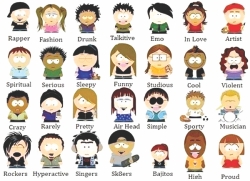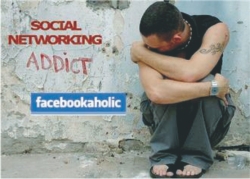| Home - Back Issues - The Team - Contact Us |
 |
| Volume 10 |Issue 42 | November 04, 2011 | |
|
|
Food for Thought Virtual Preoccupations Farah Ghuznavi Let me begin this column with a confession. I have a Facebook account. I check it over the course ofthe average day - most of which are spent, for me, chained to the demon machine that rules most of our professional (and increasingly, our personal) lives, otherwise known as the computer. So I quite enjoy my periodic forays dipping into a page that offers everything from animation clips from the talented Bangladeshi team that has created "Murgi Keno Mutant”, to film footage of dolphins and whales by the conservationist RubaiyatMonsur Mowgli, to the occasional pithy one-liner that has me nodding my head in wry agreement (like the one from my guru, Dr. Seuss's Cat in the Hat, "Be who you are and say what you feel because those who mind don't matter and those who matter don't mind”).
For most people, social networking provides what they would describe as a community of friends. This use of the word 'community' is worth taking a closer look at. After all, as William Deresiewicz points out in an article, it is precisely the breakdown of community in the US in recent decades (particularly in urban areas), that has led people to view friendship as a replacement for the closeness that such communities once provided. Yet there are questions about what kind of community is represented by online relationships, since often the connections are essentially bilateral; what is described as a community essentially consists of one person's friends - some of whom may, of course, know each other. Taking the investigation further, there are also questions about what is meant by the term "friendship" in today's highly networked world. For example, a study in 2004 found that one in American out of four i.e. nearly 25 percent, reported having no close confidants. This has soared since a similar study earlier in 1985, where the number of people reporting a lack of close friends was only one in ten i.e. 10%. Interestingly, this has taken place against a background of more frequent text messaging, status updates and tweets. In Deresiewicz's somewhat jaundiced view, it appears that the more people we know, the lonelier we get. Even if the situation isn't quite as grim as that, there is some evidence to question the counterclaims of social networking aficionados about how these sites promote friendship. Some argue, for example, that there is something a little absurd about the idea that reading an online profile or a post such as “15 of My Favourite Things” can actually tell us more about a person than knowing them for years has already taught us. Online communication has definite limitations. Among other things, typing does not allow you to pick up on nuances that can be picked up in person, through body language or voice inflection. In any case, information cannot replace experience, as Deresiewicz quite forcibly points out; it is knowing how a friend dealt with a family crisis, or what he did as an act of kindness for a colleague, or what she thinks about on a lonely night that tells us more about who they are, than what their favourite food is or where they like to take holidays (even if the latter information can be useful at times). In short, “in order to know people, you have to listen to their stories”. That requires time and intimacy. And that is hard to deliver – if not downright impossible - when you have 500+ friends!
There are also many people for whom collecting a certain number of such friends is about creating or maintaining the illusion – to themselves and others – of a degree of popularity. Quite apart from being reminiscent of high school levels of insecurity, this can be a dangerous game, since it has the potential to set the stage for a real-life disappointment when virtual relationships are put to the test. As the fiction writer and cultural critic Hal Niedzviecki found out when he decided to hold a Facebook party for his 800 online friends. Around 30 people confirmed their attendance, while 60 said maybe, several hundred said no, and the rest didn't answer. Niedzviecki estimated that he could expect around 40 people to attend the actual event. In the end, only one person showed up! Now hopefully that is an extreme case of let down, but there is probably also something to the idea that while many people want to connect online, far fewer are interested in having face-to-face interactions that might lead to (horror of horrors!) any real demands being put on them. The essential advantages of online communication lie in forming legitimate networks, based on professional or personal interests, or in strengthening pre-existing friendships through more frequent communication and information exchange. Facebook and its ilk also provide a quick way of informing people about changes in your life, of trading key facts, or of seeking certain kinds of help in a hurry e.g. attempting to identify a suitable blood donor in an emergency, or notifying your wider circle about an impending divorce (though there have also been recorded instances where one of the parties has been informed that a divorce has come through by an online change of status from their ex-partner!) And of course, in exceptional circumstances, there have also been inspiring examples of how cyber-communication has helped to unite individuals living under repressive regimes, and facilitate the coordination of movements for social change. In conclusion therefore, there is no doubt that social sites provide tangible benefits to members of the various networks. Perhaps then, the real challenge lies in managing not to confuse the more casual aspects of online friendship with commitment, and recognising the difference between intimacy and information where friends are concerned. I suspect I'm not alone in preferring Facebook to be a part of my life rather than a virtual substitute for the real thing.
Copyright
(R) thedailystar.net 2011 |
 In any event, I don't spend as much time on Facebook as many of my friends appear to; certainly not enough time to experience Facebook Fatigue. This is a relatively recent phenomenon, and is apparently on the rise among people who describe themselves as being "tired of the fact that loved ones who claim that they are too busy to pick up the phone or write a decent e-mail nevertheless spend hours on social media sites, posting one-liners, forwarding inane quizzes or uploading photographs of their children."
In any event, I don't spend as much time on Facebook as many of my friends appear to; certainly not enough time to experience Facebook Fatigue. This is a relatively recent phenomenon, and is apparently on the rise among people who describe themselves as being "tired of the fact that loved ones who claim that they are too busy to pick up the phone or write a decent e-mail nevertheless spend hours on social media sites, posting one-liners, forwarding inane quizzes or uploading photographs of their children." However,online sites can undoubtedly contribute to existing friendships. When you reconnect with old friends, from whom time, space or travel has taken you away, it can be genuinely wonderful. Most of the time though, the people you get back in touch with are not those with whom you have soul-deep connections; chances are, if you did, you would have managed to remain in contact – in some form – through the years. Friends located after some time through social networking sites are invariably people you knew at some point in your life; and most of the time, the you that they knew (and vice versa) has changed quite considerably. If you are brutally honest, you might even find that you don't have that much in common with many of them, that it is essentially nostalgia that forms the bond you have with them. Not that there is anything wrong with nostalgia or re-connecting with casual friends, it's simply worth acknowledging that that's what much of this is about.
However,online sites can undoubtedly contribute to existing friendships. When you reconnect with old friends, from whom time, space or travel has taken you away, it can be genuinely wonderful. Most of the time though, the people you get back in touch with are not those with whom you have soul-deep connections; chances are, if you did, you would have managed to remain in contact – in some form – through the years. Friends located after some time through social networking sites are invariably people you knew at some point in your life; and most of the time, the you that they knew (and vice versa) has changed quite considerably. If you are brutally honest, you might even find that you don't have that much in common with many of them, that it is essentially nostalgia that forms the bond you have with them. Not that there is anything wrong with nostalgia or re-connecting with casual friends, it's simply worth acknowledging that that's what much of this is about.